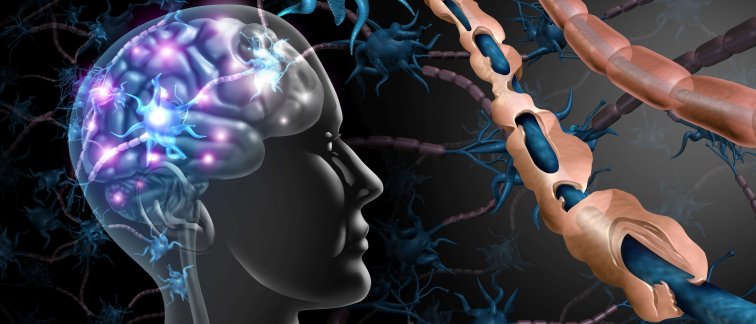
Myelin blistering as a cause of MS
Antonio Luchicchi: €788,800 for the next four years
MS is characterized by inflammation in the brain and spinal cord. The cause of these inflammations is still unknown. When studying brain material from deceased people with MS, Antonio Luchicchi found that there were specific changes in places where no other abnormalities were visible. Those changes were so-called blisters where the myelin detaches from the nerve fibers. The disrupted adhesion of myelin can cause the release of harmful substances. The body wants to clean up these harmful substances, causing an inflammatory response. Next, they found that the composition of myelin has changed. Myelin is made up of different lipids and proteins. They found an altered composition of lipids in the myelin. This may be the cause of the reduced conduction of the electrical signal.
To continue with this research two new PhD candidates will be recruited.
Diet intervention as a new treatment option
Brigit de Jong: €357,127 for the next four years
In 2021, Brigit de Jong started the LIMS study (Lifestyle Intervention for people with MS). In the LIMS study, the effect of the lifestyle program ‘Leef! met MS’ is measured based on questionnaires. In particular, the study investigates whether people with MS feel better when they change their lifestyles.
In this new study, Brigit de Jong is studying the working mechanism in the body. The Mediterranean Diet, Time Restricted Eating, and a combination of both diets are being investigated. In comparison with the control group, it is examined which diet has the most positive effects on daily functioning. In addition, it will be examined whether diet can influence the course of the disease. MRI scans, blood tests, and stool samples are used to investigate which mechanisms of action are responsible for the effects.
Literature review on fatigue in MS
Marc Rietberg: €45,895 for 18 months
In 2015, Marc Rietberg and colleagues wrote a literature review, Cochrane Review, on exercise therapy for fatigue in people with MS. This review was used to develop treatment guidelines. Over forty studies have been conducted in the past six years, therefore it is highly recommended to update the review. The new version can be used in developing improved guidelines and treatment protocols. By systematically comparing all studies in the field of fatigue, it becomes clear which developments have taken place within the research field and where there are knowledge gaps.
Source: MS Centrum Amsterdam and National MS Fund

